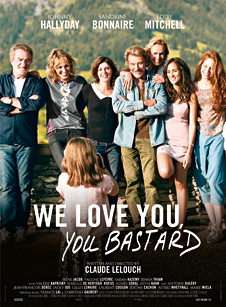WE LOVE YOU, YOU BASTARD /
Salaud, on t'aime
North American Premiere • Dramatic comedy • France, 2014
DCP • 2.35 • Dolby Digital • Color • 124 min
Directed by: Claude Lelouch
Written by: Claude Lelouch , Valérie Perrin
Cinematography: Claude Lelouch
Film Editing: Stéphane Mazalaigue
Original Score: Francis Lai et Christian Gaubert
Produced by: Claude Lelouch (Les Films 13)
Coproduced by: Rhône-Alpes Cinéma
Cast: Johnny Hallyday (Jacques Kaminsky), Sandrine Bonnaire (Nathalie Béranger), Eddy Mitchell (Frédéric Selman), Agnès Soral (Bianca Kaminsky), Irène Jacob (Printemps Kaminsky), Pauline Lefèvre (Eté Kaminsky), Sarah Kazemy (Automne Kaminsky), Jenna Thiam (Hiver Kaminsky)
International Sales: Les Films 26
French rock icon Johnny Hallyday plays Jacques, a retired war photographer attempting to live a peaceful life in the Alps. With a new girlfriend, Nathalie, he appears content, but his old friend Frédéric, played by another singing idol, Eddy Mitchell, knows better. There is a little matter of four daughters, each one from a different conquest, each one estranged from him, and each leaving their shadow on Jacques’ emotional life. Realizing that reconciliation is the thing Jacques craves most, Frédéric, a doctor, concocts a little lie to convince the daughters to visit their absentee father. Well, not so little. In fact, it’s a really big lie, and as the family gathers, as accounts are settled through tears and laughter, the lie gets harder and harder to retract. The luminous lineup of female stars includes a radiant Sandrine Bonnaire.
Living legend, writer/director Claude Lelouch said that this film is about a man arriving at the point of his life where he has a new appreciation for things, because he is experiencing them for the last time, strong words for a man who, after forty-four films, has experienced a great deal. Starting out as a film journalist, Lelouch scored a worldwide hit with A Man and a Woman (1966), which not only won the Palme d’Or, and Oscars for Best Screenplay (shared with Pierre Uytterhoeven) and Best Foreign Film, but also became an iconic soundtrack of the sixties. Although he was now the most famous filmmaker of a generation, he was also self-taught, and his earnest, sentimental films left the serious critics of Cahiers du cinéma scratching their collective heads. Audiences didn’t mind, nor did Lelouch, as he notched such hits as Les Misérables (1995), a re-interpretation set in Nazi-occupied France, and the more recent thriller Roman de gare (COLCOA 2008). With a new film already in the works, Claude Lelouch shows no sign that audiences will be experiencing his work for the last time, anytime soon.





